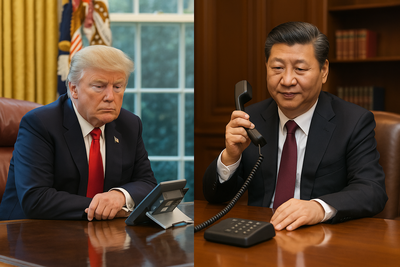US-China trade war: Why Xi Jinping is ‘ghosting’ Donald Trump

China on Monday firmly denied that President Xi Jinping has recently spoken to Donald Trump, directly contradicting the US president’s public assertions that tariff talks are underway.
“As far as I know, there has been no phone call between the two heads of state recently,” Chinese foreign ministry spokesman Guo Jiakun told reporters in Beijing. “China and the United States are not conducting consultations or negotiations on tariff issues.”
The Chinese Embassy in Washington doubled down: “China and the US are NOT having any consultation or negotiation on #tariffs. The US should stop creating confusion.”
Why it matters
- The “ghosting” of President Donald Trump by Xi Jinping isn’t just a diplomatic snub – it’s a flashing warning light for the global economy and for Trump’s own high-risk strategy.
- Without direct leader-to-leader dialogue, there’s no clear pathway to de-escalating the intensifying tariff war that now threatens to spill over into broader economic and geopolitical instability.
- Trump’s tariffs, now reaching up to 145% on Chinese goods, are beginning to bite US businesses, consumers, and markets – and China’s refusal to engage suggests it’s ready to absorb the pain longer than Washington anticipated.
- Moreover, Trump’s credibility is under fire: repeated claims of private talks with Xi – now publicly denied by Beijing and questioned even by his own treasury secretary Scott Bessent – raise doubts about the administration’s messaging and negotiating leverage.
- The lack of direct communication raises risks that miscalculations, nationalist sentiment, and political pressures on both sides could drive the two largest economies into a full-blown economic war – without an off-ramp or diplomatic buffer.
- In short: If Trump can’t get Xi on the phone, he may not be able to get a deal at all – and the fallout could be devastating not just for the US and China, but for the entire global economy.
I have great respect for President Xi. He’s been a friend of mine for a long period of time, and I think that we’ll end up working out something that’s very good for both countries
Donald Trump
The big picture
Trump, speaking to Time magazine, claimed Xi had “called” him to discuss tariffs, implying progress in talks. He repeated that assertion at the White House while leaving for Pope Francis’s funeral in Rome.
China immediately shot down the claim, and analysts quickly piled on skepticism.
Treasury secretary Scott Bessent said on ABC’s “This Week” that he was unaware of any Xi-Trump conversation, despite maintaining that they “have a very good relationship.”
As per ABC news, multiple China watchers – including Xin Sun at King’s College London and Scott Kennedy at the Center for Strategic and International Studies – agreed it’s “highly unlikely” Xi would make such a call, arguing that doing so under pressure would “signal weakness” and could endanger Xi’s political standing at home.
What they’re saying
- “It basically means that it signals weaknesses and vulnerability to possible political opponents,” Sun said.
- “I don’t think the two have communicated directly with each other since January 17,” added Kennedy.
- Bethany Allen of the Australian Strategic Policy Institute put it bluntly: “Trump is known for off-handed comments that may be somewhat less than precise.”
- “They make up bargaining chips out of thin air, bully and go back on their words, which makes everyone see one thing more and more clearly, that is the so-called ‘reciprocal tariffs’ severely go against historical trends and economic laws, impact international trade rules and order and seriously impair the legitimate rights and interests of countries,” said Zhao Chenxin, deputy director of the National Development and Reform Commission, China’s main economic planning agency.
We’ll see what happens with China. It’s important. I think it’s unsustainable from the Chinese side. So maybe they’ll call me one day.
US treasury secretary Scott Bessent
Between the lines
Trump’s go-to diplomatic playbook – escalate conflict, then pivot to a man-to-man leader summit – has run aground with Xi.
Ryan Hass of the Brookings Institution told the New York Times: “China’s leaders do not view tit-for-tat tariffs as an isolated trade issue that lends itself to a negotiated resolution.”
Instead, Beijing is choosing strategic patience: absorbing the economic shock, projecting strength, and waiting for Trump’s political hand to weaken.
Yun Sun at the Stimson Center noted that Xi “fears being treated like Zelenskyy,” referencing a disastrous Trump-Zelenskyy press conference earlier this year that left Ukraine’s leader humiliated. “The mess about the call is a total contest of egos,” she told the NYT.
Zoom in
As per a Reuters report, the trade war between the world’s two largest economies risks pushing the US into a recession, with global consequences. Meanwhile, China is trying to revive its growth after pandemic-related job losses and economic shocks.
Economists at the International Monetary Fund and several investment firms have lowered their growth forecasts for China this year to around 4%. Millions of export-focused jobs could be affected.
Despite this, Chinese officials say they are confident the economy can meet its target of about 5% growth this year, matching the pace of 2024.
Yu Jiadong, a vice minister of Human Resources and Social Security, told reporters in Beijing that a full and objective analysis shows China’s “employment policy toolbox is sufficient.”
The government plans to boost support for businesses to retain workers and promote entrepreneurship among the unemployed, Yu said.
China can also handle losing US energy imports, according to Zhao, the deputy director of the NDRC.
“Enterprises reducing or even stopping energy imports from the United States will have no impact on our country’s energy supply,” he said.
China’s Politburo last week opted against new deficit spending, aiming to maintain “composure” rather than react rashly to Trump’s tariffs.
Growth risks are real. Analysts estimate China may still need a 2 trillion yuan stimulus injection if growth falters further.
Yet officials insist new stimulus measures are “ready but not rushed,” according to policy insiders speaking anonymously to Reuters.
Larry Hu, chief China economist at Macquarie, said: “It’s much easier for Trump to walk back his tariff threat than it is for Beijing to walk back a stimulus announcement.”
What’s next?
China appears to be betting that the political and economic pain from high tariffs will cause Trump to blink first.
Meanwhile, Morgan Stanley and other banks expect Beijing to roll out 1–1.5 trillion yuan in fresh stimulus in the second half of the year if necessary, though they caution that even that may not fully offset the damage from US tariffs.
In Washington, the Trump administration is divided: Peter Navarro, Trump’s longtime China hawk, is content with frozen talks and even favors a slow-motion economic decoupling. Treasury aecretary Scott Bessent and commerce secretary Howard Lutnick urge cautious engagement, believing “a lot of confidence” exists between Trump and Xi personally.
Jamie Dimon, CEO of JPMorgan Chase, weighed in this week: “It doesn’t have to wait a year. It could start tomorrow.”
The bottom line
Xi’s cold shoulder to Trump reflects not just a tactical delay but a fundamental shift: China believes it can ride out the trade war without making immediate concessions.
As per the NYT, Trump’s dream of a personal “bromance” with Xi is slipping away, leaving the US economy exposed to escalating tariffs without an easy diplomatic off-ramp.
(With inputs from agencies)





